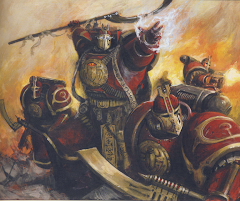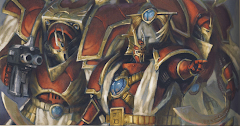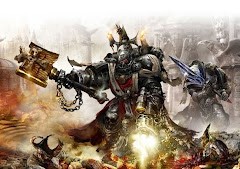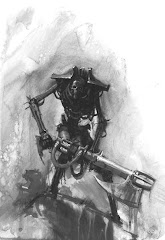There are essentially two halves to the story behind the universe of Warhammer 40,000 (or WH40K for short), and they are divided chronologically. The first half, having been originally written as the only WH40K setting, takes place in the modern 41st millennium. Most books set in this time period begin with an introductory page that looks like this:
"It is the 41st millennium.
For more than a hundred centuries the Emperor has sat immobile on the Golden Throne of Earth. He is the master of mankind by the will of the gods, and master of a million worlds by the might of his inexhaustible armies. He is a rotting carcass writhing invisibly with power from the Dark Age of Technology. He is the Carrion Lord of the Imperium for whom a thousand souls are sacrificed every day, so that he may never truly die.
Yet even in his deathless state, the Emperor continues his eternal vigilance. Mighty battlefleets cross the daemon-infested miasma of the warp, the only route between distant stars, their way lit by the Astronomican, the psychic manifestation of the Emperor’s will. Vast armies give battle in His name on uncounted worlds. Greatest amongst his soldiers are the Adeptus Astartes, the Space Marines, bio-engineered super-warriors. Their comrades in arms are legion: the Imperial Guard and countless planetary defence forces, the ever-vigilant Inquisition and the tech-priests of the Adeptus Mechanicus to name only a few. But for all their multitudes, they are barely enough to hold off the ever-present threat from aliens, heretics, mutants – and worse.
To be a man in such times is to be one amongst untold billions. It is to live in the cruelest and most bloody regime imaginable. These are the tales of those times. Forget the power of technology and science, for so much has been forgotten, never to be re-learned. Forget the promise of progress and understanding, for in the grim dark future there is only war. There is no peace amongst the starts, only an eternity of carnage and slaughter, and the laughter of thirsting gods."
Yet even in his deathless state, the Emperor continues his eternal vigilance. Mighty battlefleets cross the daemon-infested miasma of the warp, the only route between distant stars, their way lit by the Astronomican, the psychic manifestation of the Emperor’s will. Vast armies give battle in His name on uncounted worlds. Greatest amongst his soldiers are the Adeptus Astartes, the Space Marines, bio-engineered super-warriors. Their comrades in arms are legion: the Imperial Guard and countless planetary defence forces, the ever-vigilant Inquisition and the tech-priests of the Adeptus Mechanicus to name only a few. But for all their multitudes, they are barely enough to hold off the ever-present threat from aliens, heretics, mutants – and worse.
To be a man in such times is to be one amongst untold billions. It is to live in the cruelest and most bloody regime imaginable. These are the tales of those times. Forget the power of technology and science, for so much has been forgotten, never to be re-learned. Forget the promise of progress and understanding, for in the grim dark future there is only war. There is no peace amongst the starts, only an eternity of carnage and slaughter, and the laughter of thirsting gods."
It sets a rough stage for a bleak period in human history (or future history as the case may be). Humanity rules the stars, and a powerful half-dead psyker (psychic) is their god of choice. They worship him just as modern religions worship god. The million world-encompassing human empire is called The Imperium of Man, and it is held together by the ability to travel between worlds through warp space (simply called the warp). This is not too far from our concept of a wormhole, but the distinction is that there are evil, sentient beings that live there. Since humans don’t really understand the warp, they refer to these beings in a classic, gothic, and religious sense as daemons. While traveling in the warp there is no way to tell where you’re going. However, the half-dead god-emperor emits a psychic beacon and creates a futuristic version of the North Star, allowing deep space navigators to find their way.
Humanity is a race that is becoming psychic. Every psychic emits an aura that warp daemons feed on, and there is a real danger of daemonic possession. To complicate things further, the god-emperor absorbs the energy from psychic humans to keep him alive, keeping the warp beacon alive, allowing transit amongst the stars, allowing humanity to continue its Imperium. So essentially, the emperor is competing with daemons for psychic humans to prey on.
Another threat to mankind are the various alien races that roam the galaxy. They take all sorts of shapes and ideologies, and war with them is constant, threatening to dismantle imperial society one conquered world at a time.
The final threat to humanity is itself, and this comes in many forms. Some humans don’t like the Imperium and try to leave it. Whether the people of that world are attempting to annex themselves into an alien cluster of worlds, or they have devolved into a planetary daemon-worshipping cult, worlds occasionally declare their independence.
Plots to implement succession from the Imperium are ever present, and since the threat of losing a major imperial holding to a foreign power is intolerable to mankind’s single-mindedness, an organization called the Inquisition was formed. Patterned somewhat after the traditional inquisition of the medieval churches of Europe, this Inquisition is a three-fold operation run by free-thinking agents – inquisitors of the ordos Malleus, Hereticus and Xenos – each agency and its agents rooting out threats to imperial security in their own way.
Stories of the Inquisition, along with the Imperium’s fighting forces (the aforementioned Space Marines and Imperial Guard) make up the bulk of WH40K fiction. However, the second half of the background material takes place ten thousand years before the current story line era – in the year 30,000 – and in this more recently developed series of novels, it is introduced with the following passage:
"…10,000 Years Earlier
The Horus Heresy
It is a time of Legend.
Mighty heroes battle for the right to rule the galaxy. The vast armies of the Emperor of Earth have conquered the galaxy in a Great Crusade – the myriad alien races have been smashed by the Emperor’s elite warriors and wiped from the face of history.
The dawn of a new age of supremacy for humanity beckons.
Gleaming citadels of marble and gold celebrate the many victories of the Emperor. Triumphs are raised on a million worlds to record the epic deeds of his most powerful and deadly warriors.
First and foremost amongst these are the Primarchs, superheroic beings who have led the Emperor’s armies of Space Marines in victory after victory. They are unstoppable and magnificent, the pinnacle of the Emperor’s genetic experimentation. The Space Marines are the mightiest human warriors the galaxy has ever known, each capable of besting a hundred normal men or more in combat.
Organised into vast armies of tens of thousands called Legions, the Space Marines and their Primarch leaders conquer the galaxy in the name of the Emperor.
Chief amongst the Primarchs is Horus, called the Glorious, the Brightest Star, favourite of the Emperor, and like a son unto him. He is the Warmaster, the commander-in-chief of the Emperor’s military might, subjugator of a thousand thousand worlds and conqueror of the galaxy. He is a warrior without peer, a diplomat supreme.
As the flames of war spread through the Imperium, mankind’s champions will all be put to the ultimate test."
This prequel story arc tells the story of the schism between the brothers of the Space Marine Legions, and is currently in the process of giving a very complete and detailed account of what happened ten thousand years previous to the current timeline. The thing that makes this historical account interesting is its ability to inspire my sense of wonder about Earth history. What if we all of a sudden had a written account of what happened throughout all of human history? It would be rather amazing.
To avoid inducing narcoleptic tendencies in my readers, I’ll simply say “If you want to read further into the background of the WH40K universe, check out the following links:”
http://www.criticalhit.co.uk/component/option,com_wrapper/Itemid,55/
http://warhammer40k.wikia.com/wiki/Timeline
In addition there are an unlimited number of online resources dedicated to this all-encompassing storyline, most of which can be found linked to a simple Wikipedia search for Warhammer 40k.
http://www.criticalhit.co.uk/component/option,com_wrapper/Itemid,55/
http://warhammer40k.wikia.com/wiki/Timeline
In addition there are an unlimited number of online resources dedicated to this all-encompassing storyline, most of which can be found linked to a simple Wikipedia search for Warhammer 40k.






























No comments:
Post a Comment